I Visited 8 European Christmas Markets in 2 Weeks — and These Were My Favorites
Here's what it's like to visit the Christmas markets in Germany, France, Switzerland, Austria, and Belgium — all in one trip.
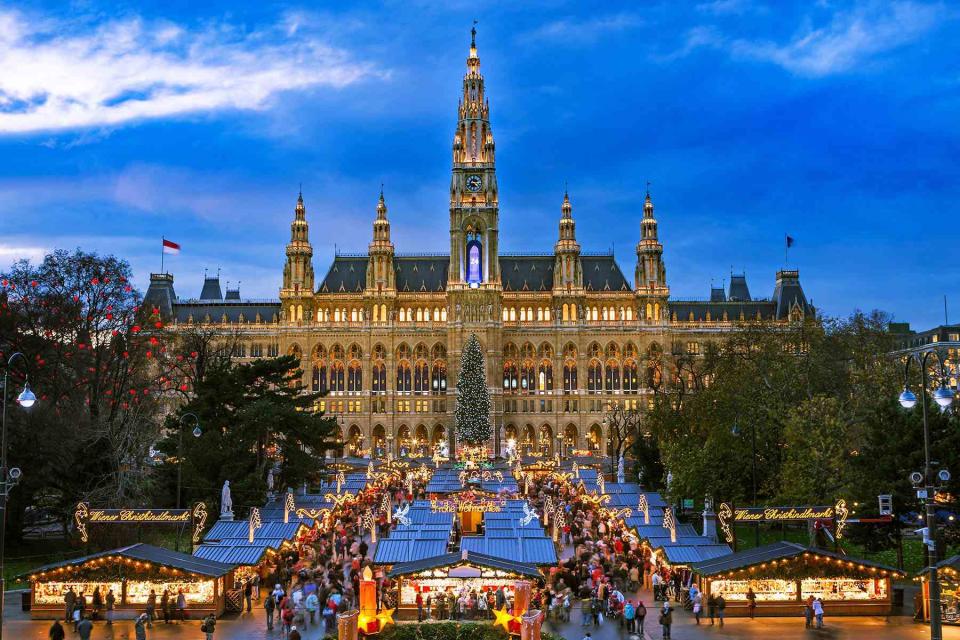
pressdigital/Getty Images
I have my hometown of Chicago to thank for my love of Christmas markets. When I was growing up, my family would make the one-hour trek from our northern suburb to Daley Plaza, where the Christkindlmarket is held. There would be a huge discussion around which weekend to go: The market opens in mid-November, so picking a pre-December Saturday or Sunday means you'll be less likely to run into crowds, but still a full month out from Christmas. On the other hand, venturing into the city closer to Dec. 25 guarantees you’ll be standing shoulder to shoulder with hundreds of other glühwein seekers, but the excitement and festivity of the season somehow makes the packed stalls feel quaint rather than claustrophobic.
In order to find a happy medium, we’d typically choose the first weekend in December, which coincides with my twin sister's and my birthday. Our fondness of the Christkindlmarket is shared, and one year we got to talking about what it would be like to visit the markets this German-style one is based on. That’s how we found ourselves traveling across five European countries over the course of two weeks on a belated 30th birthday trip that had been delayed a few times due to COVID-19.
My twin sister, Amanda, planned the whole thing, comparing "best of" lists from popular travel sites, researching the best modes of transportation to hop from one city to the next, and I got to go along for the magical ride. All in all, we basked in the wonder and pure joy of eight traditional European Christmas markets — here's what it was like.
Brussels, Belgium
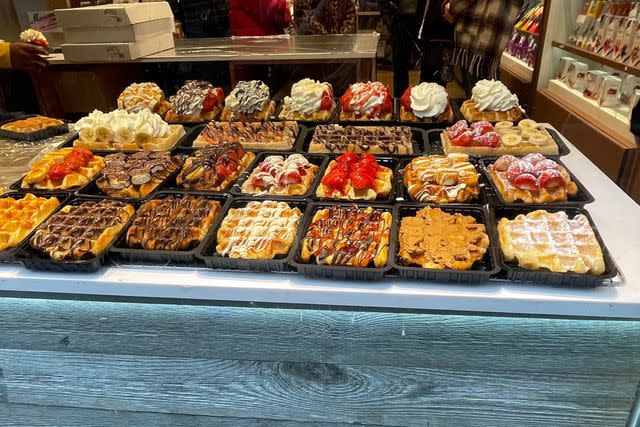
Allison Cacich
We chose Belgium as our first stop largely because neither Amanda nor I had ever been. Brussels’ Christmas market doesn’t often crack the top 10 lists, but they have one, which was a good enough reason for us to explore the city for the first time. The main market, located beneath the stunning facade of Saint Catherine’s Church, was a sight to behold, with its towering Ferris wheel, pommes frites stands, and six-tiered windmill-style bar — which is actually based on a German Christmas decoration dating back to the 16th century. Each street felt as though it was decked out for the holiday, and there were fun surprises around every corner.
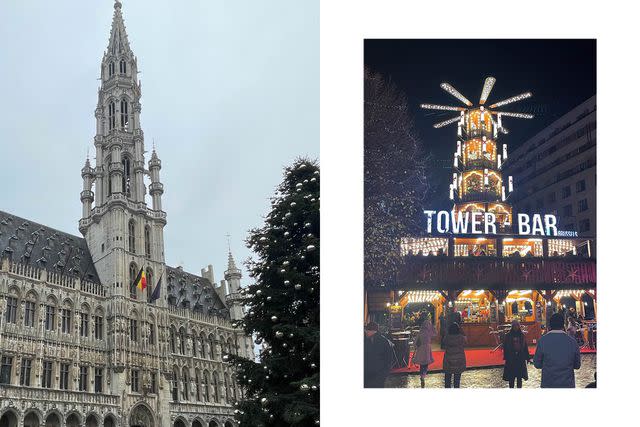
Allison Cacich
One of our favorite stops was Grand-Place’s central square. It contains the city’s Town Hall (built between 1401 and 1455), the neo-Gothic Brussels City Museum (also known as the “Bread House” as it sits on the site of a former bread market), and the guildhalls of Brussels. On our first night, we were delighted to stumble across an elaborate sound and light show that took over the entire square and ended with an illumination of the Grand-Place Christmas tree. As it turns out, this is a huge production, taking place 57 times per week from late November to Jan. 1.
Day Trip to Bruges, Belgium
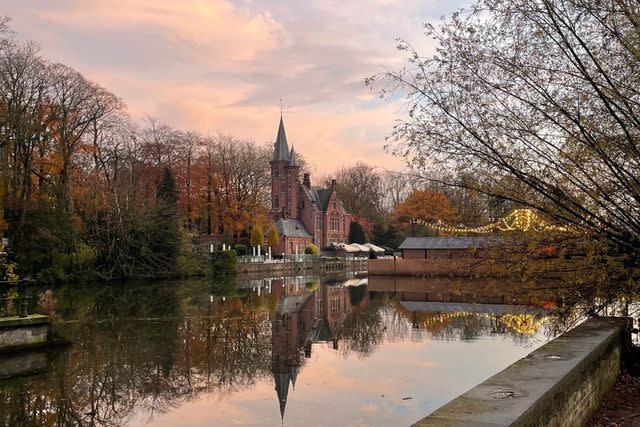
Allison Cacich
It takes about an hour via train to get from Brussels to Bruges, and within minutes of arriving in the canal-surrounded city, I was hooked on its fairy-tale charms. With its winding streets and cobblestone roads, I felt as though I had been transported into Disney’s "Beauty and the Beast." Similar to Brussels, the Christmas market here wasn’t the main attraction: What I loved most about Bruges were its chocolate and Belgian waffle shops and picturesque waterways.
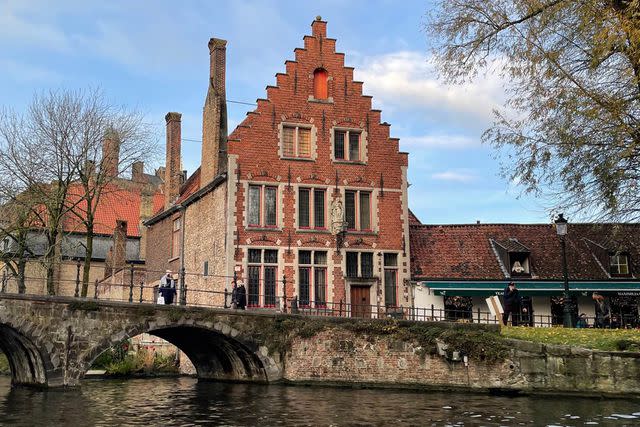
Allison Cacich
Once again, the highlight of our day wasn’t planned. After walking around Old Town, Amanda and I spontaneously hopped on a 35-minute boat ride around Bruges’ canals, giving us an entirely different view of the city. Since the medieval architecture has largely been undisturbed, it feels like you’re floating through a different time period, with a healthy dose of holiday cheer sprinkled in thanks to the garland strands and twinkling lights dotting almost every building. And if you have the stamina, I recommend traversing Belfry Tower’s 366 steps. Though it’s a steep and narrow climb, you can see the entirety of Bruges from the top, and may even be treated to a performance by the bells hanging right above.
Strasbourg, France
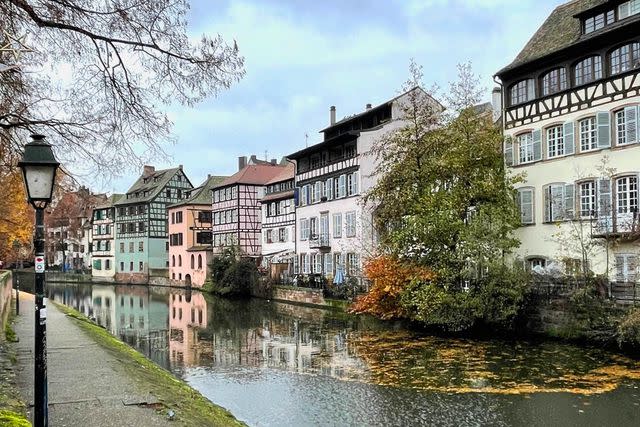
Allison Cacich
To get to our next location, we took a train from Brussels to Frankfurt, Germany, where we then caught another train to Strasbourg, France. The entire journey took about five and a half hours. Strasbourg is known as the Capitale de No?l (Christmas Capital), and it certainly lives up to that name. Our hotel had a map showing where all 13 (yes, 13) Christmas markets are located around the city, and we managed to visit all over the course of one day. Since Strasbourg is located in the Alsatian region of France, my sister was keen to try some of the traditional cuisine, including tarte flambée, a flatbread-style dish that’s often topped with fromage blanc, thinly sliced onions, and cubes of bacon. These meals were a definite highlight.
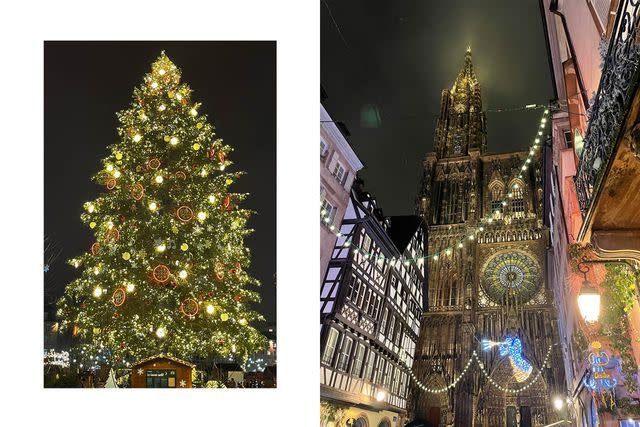
Allison Cacich
Though there are more than a dozen Christmas markets, each one felt unique, like its own little world. We circled back to two groupings of stalls more than once. First, the Strasbourg Cathedral was the backdrop for five different markets, one of which sold Alsatian delicacies like mannele (milk bread in the shape of a little man). But the magnificent tree could be found at Place Kléber, the city’s central square. We walked up right as the light show was starting. Though we were surrounded by strangers, in that moment, it felt as though we were united in witnessing something magical.
Colmar, France
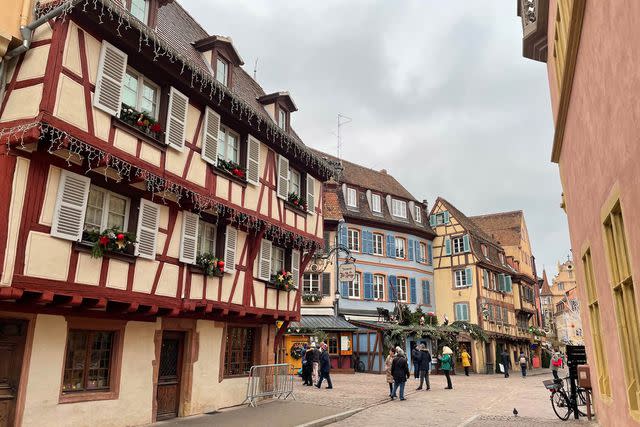
Allison Cacich
We could’ve taken a day trip from Strasbourg to neighboring Colmar (a 30-minute train ride), but we elected to spend the night in the northeastern French city. Colmar, with a population of around 70,000, feels like a mini Strasbourg and has the most delectable patisserie shops lining its streets. We chose one overlooking St. Martin’s Church, and enjoyed dessert and coffee while bundled under a pair of blankets. When looking for restaurants, many were at capacity due to their small dining rooms, but we managed to find a pub with open tables that served a delicious tarte flambée.
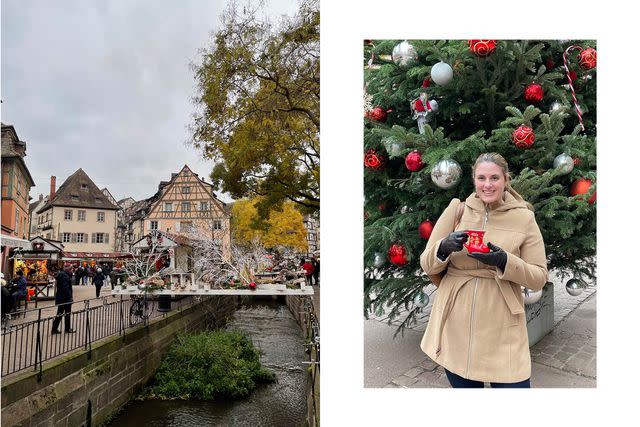
Allison Cacich
The stalls at the Christmas markets were beautiful and depicted different scenes — some religious, some seasonal. This is where a better grasp on the French language would have come in handy, since about half of the vendors we encountered didn’t speak English. Still, we had our fill of mulled wine, stuffed pretzels, cheeses, jams, and macarons. I also spotted a couple of buildings that looked like real-life gingerbread houses.
Basel, Switzerland
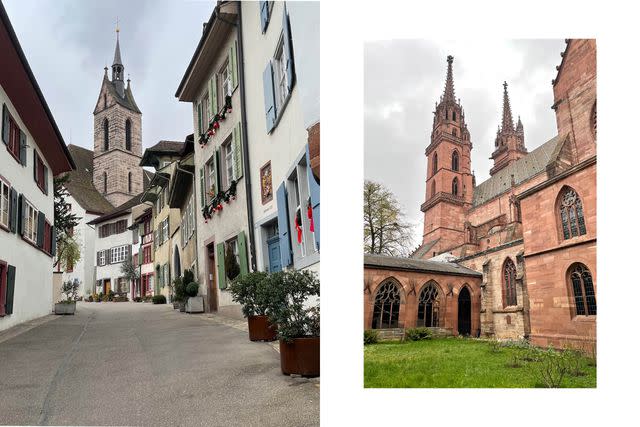
Allison Cacich
Next, we headed to Basel, Switzerland, which took about 45 minutes via train. There are two big Christmas markets in the city: The larger one is in Barfüsserplatz, set below a former Franciscan monastery and erected near the Spielzeug Welten Museum, also known as the Toy Worlds Museum, perfect for kids and kids at heart. The more intimate market in Münsterplatz looked like it was plucked straight from the pages of a storybook. Nestled beneath a grove of trees adorned with twinkling lights, the stalls are situated next to Basel’s most famous landmark, Basel Minster.
Having never been to Basel, we weren’t expecting hilly streets, but we certainly got a workout while walking around the Old Town. We were able to see the city’s 500-year-old Town Hall and the Spalentor gate, which dates back to the 15th century. Though we had eaten our weight in potato pancakes and sausage throughout the day, my sister found a restaurant that served fondue under the stars, which was the perfect end to a Swiss evening.
Vienna, Austria
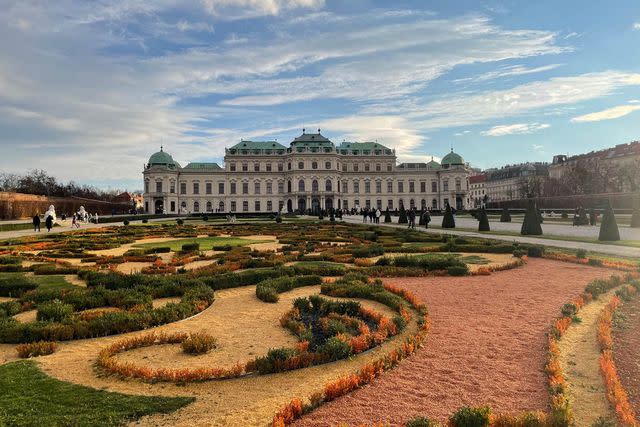
Allison Cacich
Confession: I was most excited to visit Vienna during our trip because I had spent a semester there during my sophomore year of college. It was the first time I had been back in more than 10 years. By the time we left the hotel that first night, it was dark, so Amanda and I decided to walk the short distance to Rathausplatz Christkindlmarkt, the city’s largest and most famous Christmas market. I’ll never forget turning a street corner and seeing Rathausplatz in all of its glory.
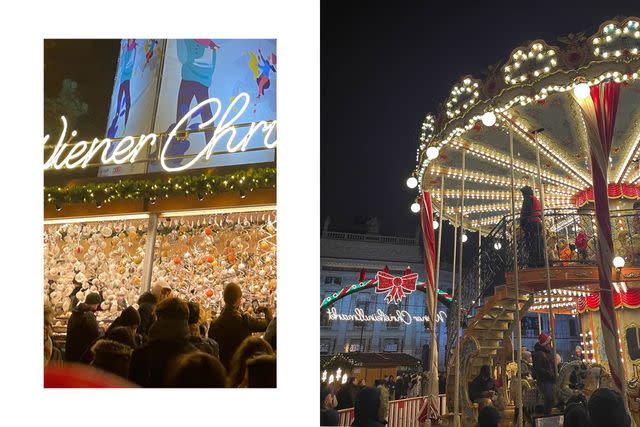
Allison Cacich
At the entrance, visitors walk through a giant advent wreath arch to a double-decker carousel. Turn right and you’re surrounded by light sculptures on all sides before winding up at a Ferris wheel that offers a bird’s-eye view of the remarkable spectacle sprawled out beneath. To the left of the arch is an ice-skating rink with a canopy of fairy lights. At the risk of sounding cliché, the whole scene took my breath away. Smack dab in the middle of the market are stalls, including one with hundreds of sparkling ornaments hanging from the ceiling. After indulging in bratwurst and sugar-coated pecans, my sister and I each took home a heart-shaped glühwein mug as a souvenir. Over the next two days, we also visited markets at Karlsplatz and Belvedere Palace, and enjoyed the Italian opera "Tosca" at Vienna’s famed opera house. It became clear that Vienna is a must-see during Christmastime.
Munich, Germany
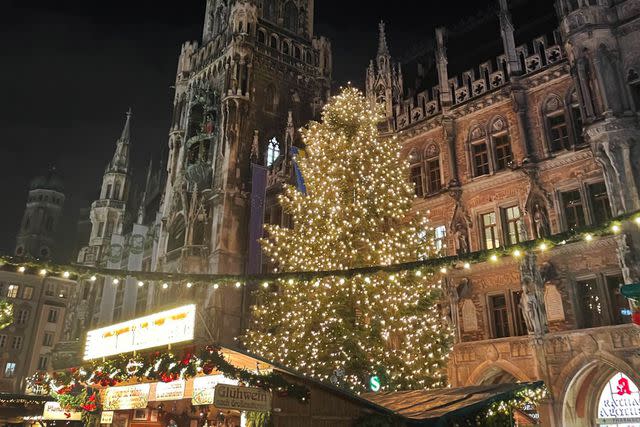
Allison Cacich
After a week and a half, we finally made it to Germany, which is where the tradition of Christmas markets originated. Munich served as our home base while we set out on a couple of day trips around Bavaria. But the city has a pretty impressive Christmas market of its own, set in Marienplatz, the main square, beneath the town hall (referred to as the New Town Hall since, at just 117 years old, it’s new for European standards). These stalls had the best selection of food by far, featuring various types of sausages, candied nuts, and an abundance of chocolate-covered fruit.
One thing I love about Chicago’s Christkindlmarket is that each year brings a newly designed glühwein mug. For many Chicagoans, these mugs become collector’s items. I was thrilled to see that Munich not only embraces specialty glühwein mugs, but also takes them to the next level by selling different designs at every stall. On a blustery night, a cup of mulled wine was exactly what we needed.
Day Trip to Neuschwanstein Castle
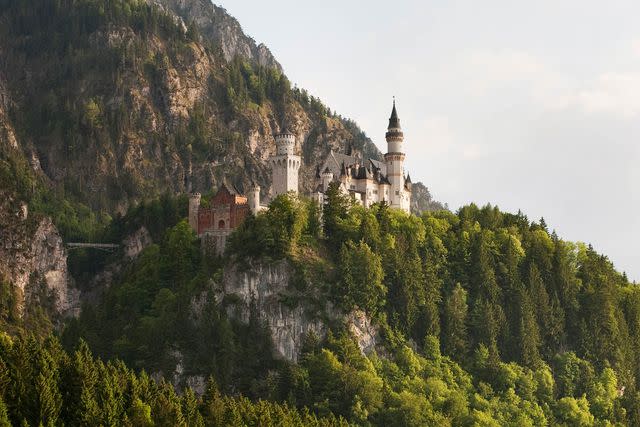
Thomas Winz/Getty Images
I've wanted to visit Neuschwanstein Castle, which served as the inspiration for Sleeping Beauty’s Castle at Disneyland, since I first saw a photo of it majestically sitting atop a hill in the Bavarian countryside. But the castle isn’t exactly easy to reach. Situated in the village of Hohenschwangau near Füssen, it takes a little more than two hours to get from Munich to Neuschwanstein. Luckily, my travel companion was just as excited to see it as I was, so we dedicated an entire day to the attraction.
I had been told that because the castle was never completed following the sudden death of King Ludwig II of Bavaria, who commissioned the project as a private residence in 1869, there wasn’t much to look at on the inside. That’s far from true — the rooms that were finished before the king’s death in 1886 magnificently capture his romantic interpretation of the Middle Ages, making it feel as though you’ve entered a real-life fairy tale. If you do find yourself at Neuschwanstein, make sure to tour the neighboring castle, Hohenschwangau, where King Ludwig II spent summers with his family and could keep an eye on the construction of his new palace.
Day trip to Nuremberg, Germany
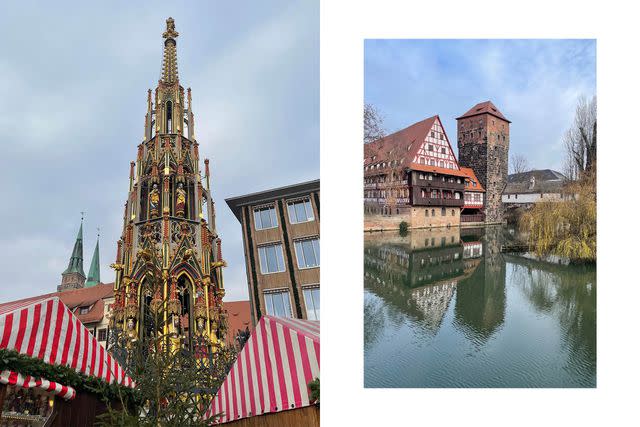
Allison Cacich
We saved the world’s most famous Christmas market for last. Nuremberg’s Christkindlesmarkt dates back to the mid-16th century, and an estimated two million people visit the array of stalls each holiday season. It takes a little more than an hour to get from Munich to Nuremberg by train, and the market is located in the heart of the city’s Old Town. Though it was smaller than we were expecting, this Christmas market ended up being my favorite. Why? For starters, the setting. The Hauptmarkt (or main market square) is anchored by a gorgeous 14th-century church and fountain in the shape of a Gothic spire. It was the most crowded market by far, but still somehow felt intimate.
The quality of the stalls is also top-notch. I had held off on buying ornaments throughout our trip because they’re difficult to transport, but it soon became clear that I couldn’t leave this market without one. I ended up choosing a round bauble that depicted the exact scene I was standing in, and it’s a keepsake I will cherish forever. Amanda and I also ventured outside the main square to explore the city. We walked to a medieval cemetery, which was a maze of intricately carved raised tombstones, and explored the Nuremberg Trials Memorial, one of the best museums I’ve visited in recent memory.
Flight Home From Munich
As we boarded the plane home after an eventful two weeks, I couldn’t help but feel grateful. There’s a reason why so many people look forward to Christmastime: It’s festive, fun, and a chance for total strangers to connect over a shared love of joy — and I could feel that joy emanating at every single stop we made.
For more Travel & Leisure news, make sure to sign up for our newsletter!
Read the original article on Travel & Leisure.
